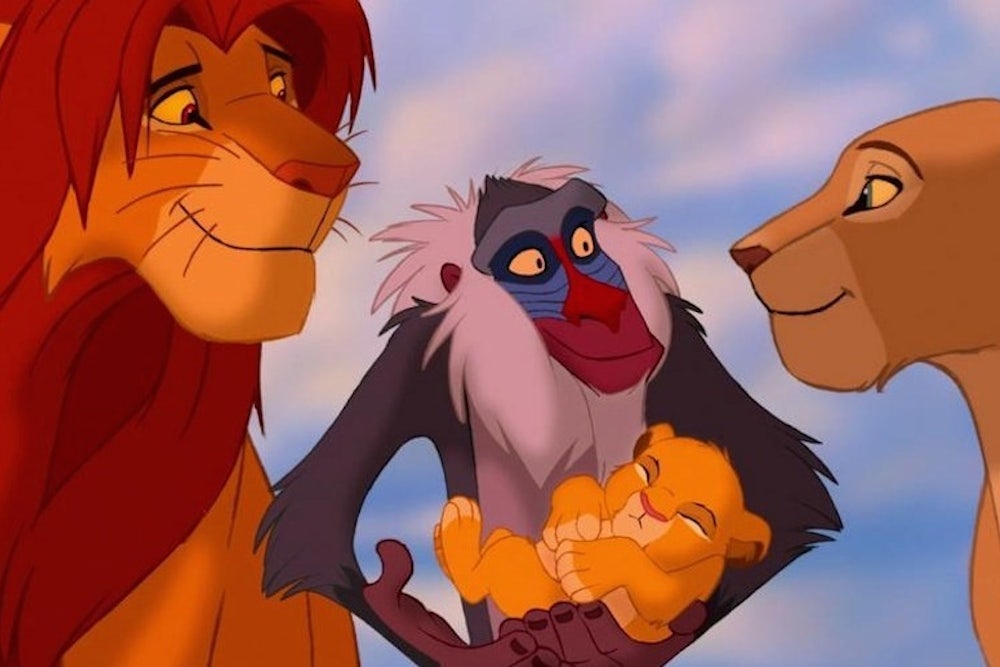ACCRA, Ghana — Last month, Delta Airlines posted a tweet congratulating the United States for defeating Ghana in the World Cup. The tweet featured two images, each representing one of the countries. For the United States, Delta chose the Statue of Liberty. And for Ghana, it showed a picture of a giraffe.
That’s not because “Ghana” and “giraffe” both begin with “G.” It’s because Ghana is in sub-Saharan Africa, of course. When I showed the Delta message to a friend here, he wasn’t surprised. “Americans think Africa is just for animals,” he said. “There aren’t any people here.”
That’s also the underlying message of The Lion King, which is celebrating its 20th anniversary last month. The second-highest-grossing Disney film of all time, eclipsed only by the recent blockbuster Frozen, The Lion King depicts hundreds of animals cavorting across a rugged African landscape. All that’s missing are Africans themselves.
To be sure, The Lion King has faced its share of criticism over the years. Some American viewers thought the hyena characters—voiced by Whoopi Goldberg and Cheech Marin—reflected negative images of blacks. Others said that Scar, the evil uncle of the film’s protagonist, embodied offensive gay stereotypes. But the debate about racist and anti-gay imagery in the film has a narrowly American ring to it.
Caught up in our own anxieties about race and gender relations at home, we’ve lost sight of the fact that our most popular movie about Africa reduces the entire continent to a game reserve. So does DreamWorks's 2005 animated hit Madagascar—in which Ben Stiller voices a neurotic lion—and the 2011 nature documentary African Cats, another Disney production.
For Americans, the Africa-as-animals idea goes back to Theodore Roosevelt’s reports on his safari in 1909-1910, shortly after Roosevelt left the White House. In serialized magazine articles, Roosevelt thrilled American readers with tales of pursuing big game in a vast, “uncivilized” land. He brought back over 20,000 specimens—including lions, elephants, and rhinoceros—for donation to the Smithsonian Institution.
Then came Tarzan, the series of adventure stories by Edgar Rice Burroughs. Adapted into several Hollywood blockbusters, Tarzan described a boy who was raised by apes in the thick jungles of Africa. And like Roosevelt’s safari reports, it encouraged Americans to think of the continent as a pristine, primitive setting for exotic beasts.
But most actual Africans don’t come any closer to wildlife than Westerners do. Millions of people on the continent have left their rural homelands for cities, where the only place to see wild animals is at the zoo; out on the countryside, meanwhile, poaching and environmental hazards have dramatically reduced the population of lions, elephants, and other wildlife.
To be fair, there really was a time when these creatures were commonplace across big swaths of Africa. In his 2012 memoir, Ghanaian President John Dramani Mahama describes how his father encountered a pride of lions during his 120-mile trek to a boarding school. He was hoisted into a tree and spent the night there, until the lions had moved on.
They're long gone from Ghana, and from most other parts of the continent. But they live on in our minds, where Africa remains America's favorite setting for primitive fantasies. It’s a symbol and a metaphor, not a real place.
That’s also why it’s so often seen as a homogenous whole, rather than as a set of different countries and cultures. Trying to make The Lion King true to its location, the movie’s creative team did landscape research in Kenya. Yet by situating the film in “Africa”—instead of in a specific nation or region—the film also furthered the myth that the continent is a single, undifferentiated entity. (Madagascar partly takes place in the country, but the plot concerns Central Park Zoo animals who land there by accident: a hippo, lion, giraffe, zebra, all of which are not indigenous to the island nation in the Indian Ocean.)
Both of my daughters were born in the 1990s, so we watched a lot of The Lion King. It’s a lovely story with some great music. But it’s also part of a century-long trend to portray a giant, diverse continent as an animal theme park. Go to any actual theme park in the United States, meanwhile, and anything Africa-related will almost inevitably feature animals.
I’m not suggesting any conspiracy or ill intent here. The culprit is our overall ignorance of the real Africa, which allows mass media to substitute a mythical one. According to a survey conducted by National Geographic in 2006, at the height of the Darfur controversy, over half of Americans aged 18-24 didn’t know that Sudan was in Africa.
But Darfur reinforced another common misconception of Africa: that it's a place of unending hunger, violence, and misery. This summer, I've received anxious emails from the United States asking whether I'm under threat from Boko Haram—the terrorist group that kidnapped 200 schoolgirls in Nigeria—or the Ebola outbreak. Never mind that two other nations stand between Nigeria and Ghana, or that Ebola has been restricted to three countries that don't border this one.
Yes, millions of Africans have been scarred by war, poverty, and disease. But Africa isn't just the sum total of its human misery, any more than it's one huge animal safari. In recent years, Ghana has made big gains in education, health, and industry. And it doesn't have a single giraffe.
Correction: A previous version of this article stated that poaching and environmental hazards have dramatically reduced the population of tigers. Rather, these threats have reduced the population of lions. Tigers aren't indigenous to Africa.
